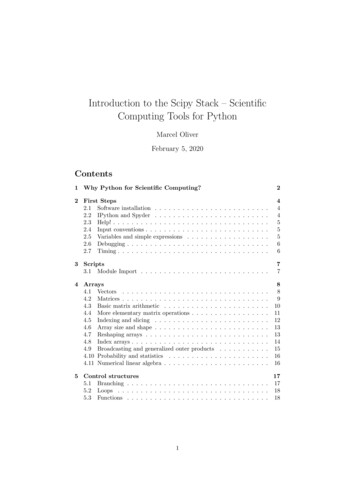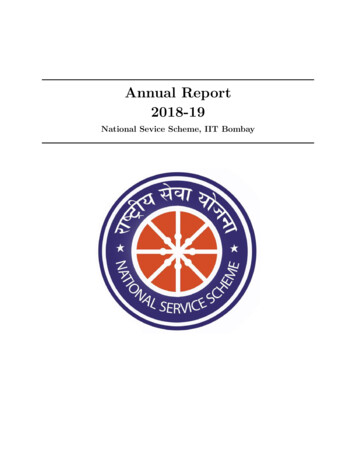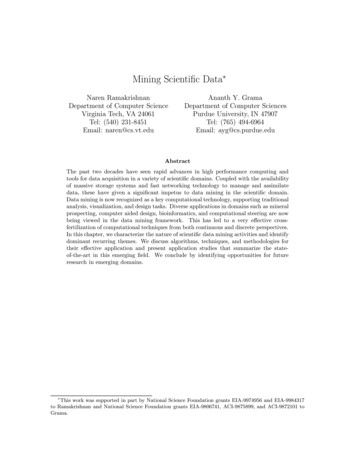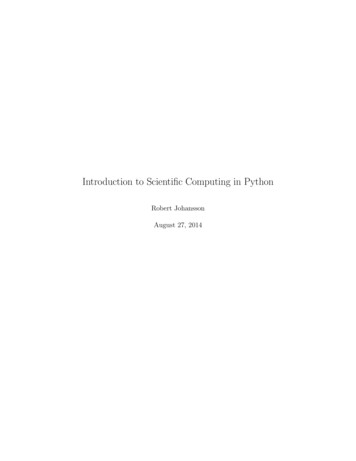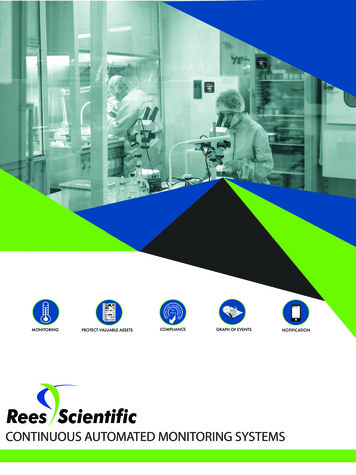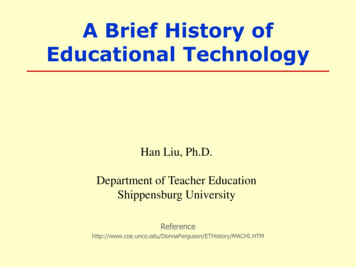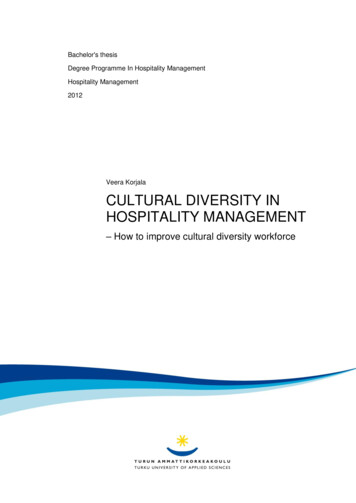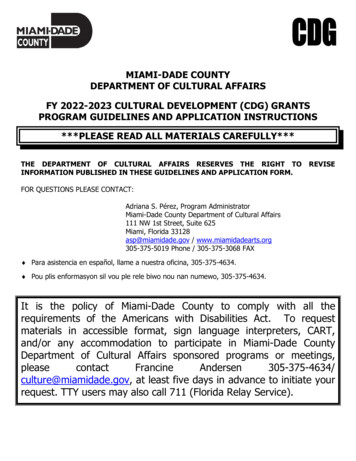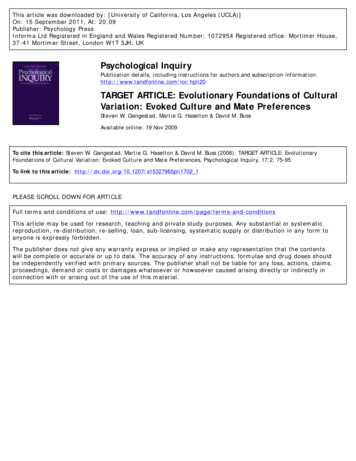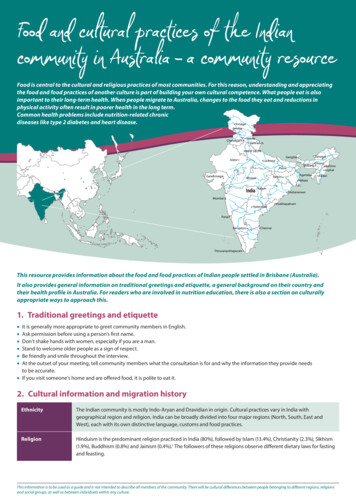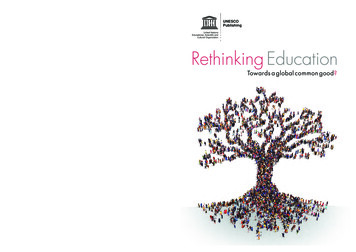
Transcription
UNESCOPublishingUnited NationsEducational, Scientific andCultural OrganizationWe are living in a world characterized by change, complexityand paradox. Economic growth and the creation of wealthhave cut global poverty rates, yet vulnerability, inequality,exclusion and violence have escalated within and across societiesthroughout the world. Unsustainable patterns of economic production andconsumption promote global warming, environmental degradation andan upsurge in natural disasters. Moreover, while we have strengthenedinternational human rights frameworks over the past several decades,implementing and protecting these norms remains a challenge. And whiletechnological progress leads to greater interconnectedness and offersnew avenues for exchange, cooperation and solidarity, we also seeproliferation of cultural and religious intolerance, identity-based politicalmobilization and conflict. These changes signal the emergence of anew global context for learning that has vital implications for education.Rethinking the purpose of education and the organization of learning hasnever been more urgent.This book is intended as a call for dialogue. It is inspired by a humanisticvision of education and development, based on respect for life andhuman dignity, equal rights, social justice, cultural diversity, internationalsolidarity and shared responsibility for a sustainable future. It proposesthat we consider education and knowledge as global common goods,in order to reconcile the purpose and organization of education as acollective societal endeavour in a complex world.EducationSectorUnited NationsEducational, Scientific andCultural Organization9 789231 000881Rethinking EducationTowards a global common good?
Rethinking EducationTowards a global common good?
Published in 2015 by the United Nations Educational, Scientific and Cultural Organization,7, place de Fontenoy, 75352 Paris 07 SP, France UNESCO 2015ISBN 978-92-3-100088-1This publication is available in Open Access under the Attribution-ShareAlike 3.0 IGO (CC-BY-SA 3.0 IGO) 3.0/igo/). By using the content of this publication, the users acceptto be bound by the terms of use of the UNESCO Open Access Repository a-en).The designations employed and the presentation of material throughout this publication do not imply the expression ofany opinion whatsoever on the part of UNESCO concerning the legal status of any country, territory, city or area orof its authorities, or concerning the delimitation of its frontiers or boundaries.The members of the Senior Experts’ Group are responsible for the choice and the presentation of the facts containedin the publication and for the opinions expressed therein. These are not necessarily those of UNESCO and do notcommit the Organization.Graphic design: UNESCOCover photo credit: Shutterstock / ArthimedesPrinted by UNESCOPrinted in France
ForewordWhat education do we need for the 21st century? What is the purpose of educationin the current context of societal transformation? How should learning be organized?These questions inspired the ideas presented in this publication.In the spirit of two landmark UNESCO publications, Learning to Be: The world ofeducation today and tomorrow (1972), the ‘Faure Report’, and Learning: The treasurewithin (1996), the ‘Delors Report,’ I am convinced we need to think big again todayabout education.For these are turbulent times. The world is getting younger, and aspirations for humanrights and dignity are rising. Societies are more connected than ever, but intolerance andconflict remain rife. New power hubs are emerging, but inequalities are deepening andthe planet is under pressure. Opportunities for sustainable and inclusive developmentare vast, but challenges are steep and complex.The world is changing – education must also change. Societies everywhere areundergoing deep transformation, and this calls for new forms of education to fosterthe competencies that societies and economies need, today and tomorrow. Thismeans moving beyond literacy and numeracy, to focus on learning environments andon new approaches to learning for greater justice, social equity and global solidarity.Education must be about learning to live on a planet under pressure. It must be aboutcultural literacy, on the basis of respect and equal dignity, helping to weave togetherthe social, economic and environmental dimensions of sustainable development.This is a humanist vision of education as an essential common good. I believe thisvision renews with the inspiration of the UNESCO Constitution, agreed 70 years ago,while reflecting new times and demands.Education is key to the global integrated framework of sustainable development goals.Education is at the heart of our efforts both to adapt to change and to transform theworld within which we live. A quality basic education is the necessary foundation forlearning throughout life in a complex and rapidly changing world.3
Across the world, we have seen great progress in expanding learning opportunitiesfor all. Yet we must draw the right lessons to chart a new course forward. Access isnot enough; we need a new focus on the quality of education and the relevance oflearning, on what children, youth and adults are actually learning. Schooling and formaleducation are essential, but we must widen the angle, to foster learning throughoutlife. Getting girls into primary school is vital, but we must help them all the way throughsecondary and beyond. We need an ever stronger focus on teachers and educators aschange agents across the board.There is no more powerful transformative force than education – to promote humanrights and dignity, to eradicate poverty and deepen sustainability, to build a betterfuture for all, founded on equal rights and social justice, respect for cultural diversity,and international solidarity and shared responsibility, all of which are fundamentalaspects of our common humanity.This is why we must think big again and re-vision education in a changing world.For this, we need debate and dialogue across the board, and that is the goal of thispublication – to be both aspirational and inspirational, to speak to new times.Irina BokovaDirector-General of UNESCO4
AcknowledgementsI am pleased to see this publication released at this particular historical juncture whenthe international education and development community moves towards the globalframework of Sustainable Development Goals. The present publication is the result ofmy early discussions with Ms Irina Bokova, Director-General of UNESCO, during herfirst mandate. She strongly supported the idea of reviewing the ‘Delors Report’ in orderto identify future orientations of global education. She wisely wished to demonstratethat, beyond its lead technical role in the Education for All movement, UNESCO alsohas an important intellectual leadership role in international education.It is in this perspective that the Director-General of UNESCO established a SeniorExperts’ Group to rethink education in a changing world. The group of internationalexperts was tasked with preparing a succinct document that identified issues likely toaffect the organization of learning and to stimulate debate on a vision for education.The group was co-chaired by Ms Amina J. Mohammed, Special Advisor to theUnited Nations Secretary-General on Post-2015 Development Planning and AssistantSecretary-General, and Professor W. John Morgan, UNESCO Chair at the Universityof Nottingham, in the United Kingdom. Other members of the Senior Experts’Group included: Mr Peter Ronald DeSouza, Professor at the Centre for the Study ofDeveloping Societies, New Delhi, India; Mr Georges Haddad, Professor at UniversitéParis 1 Panthéon-Sorbonne, France; Ms Fadia Kiwan, Director Emeritus of the Institutdes Sciences Politiques at Université Saint-Joseph in Beirut, Lebanon; Mr Fred vanLeeuwen, Secretary-General of Education International; Mr Teiichi Sato, Professor atthe International University of Health and Welfare in Japan; and Ms Sylvia Schmelkes,President of the National Institute for the Evaluation of Education in Mexico.From the outset, the Director-General gave the UNESCO Education Sector strongsupport to undertake this project. Coordinated by the Education Research and Foresightteam, the Group met in Paris in February 2013, February 2014, and December 2014 todevelop their ideas and debate successive drafts of their text. I would like to take thisopportunity to sincerely thank all the members of the Senior Experts’ Group for their5
invaluable contribution to this important collective endeavour. The UNESCO EducationSector is very grateful for their efforts and commitment.This publication would not have been possible without the contribution of numerouspeople, external experts as well as UNESCO colleagues. I would like to acknowledgeand thank them for their support: Abdeljalil Akkari (University of Geneva), MassimoAmadio (UNESCO International Bureau of Education), David Atchoarena (UNESCODivision for Policies and Lifelong Learning Systems), Sylvain Aubry (Global Initiativefor Economic, Social and Cultural Rights), Néjib Ayed (Arab League Educational,Cultural and Scientific Organization), Aaron Benavot (Education for All GlobalMonitoring Report), Mark Bray (University of Hong Kong), Arne Carlsen (UNESCOInstitute for Lifelong Learning), Michel Carton (Network of International Policies andCooperation in Education and Training), Borhene Chakroun (UNESCO Section forYouth, Literacy and Skills Development), Kai-ming Cheng (University of Hong Kong),Maren Elfert (University of British Columbia), Paulin J. Hountondji (National Councilof Education of Benin), Klaus Hüfner (Freie Universität Berlin), Ruth Kagia (Resultsfor Development), Taeyoung Kang (POSCO Research Institute, Seoul), Maria Khan(Asia South Pacific Association for Basic and Adult Education), Valérie Leichti (SwissAgency for Development Cooperation), Candy Lugas (UNESCO International Institutefor Educational Planning), Ian Macpherson (Open Society Foundations), Rolla MoumneBeulque (UNESCO Section of Education Policy), Renato Opertti (UNESCO InternationalBureau of Education), Svein Osttveit (Executive Office, UNESCO Education Sector),David Post (Education for All Global Monitoring Report), Sheldon Shaeffer (Specialist onEarly Childhood Education and Governance), Dennis Sinyolo (Education International),and Rosa-Maria Torres (Instituto Fronesis, Quito).Finally, I am grateful to the Education Research and Foresight team at UNESCO forbringing this project to fruition. Initiated by Georges Haddad, former Director of theteam, the drafting process was led and coordinated by Sobhi Tawil, Senior ProgrammeSpecialist. They were assisted by Rita Locatelli and Luca Solesin from the UNESCOChair on Human Rights and Ethics of International Cooperation at the Universityof Bergamo, Italy, as well as by Huong Le Thu, Programme Specialist at UNESCO.Other research assistants included Marie Cougoureux, Jiawen Li, Giorgiana Maciuca,Guillermo Nino Valdehita, Victor Nouis, Marion Poutrel, Hélène Verrue and Shan Yin.Qian Tang, Ph.D.Assistant Director-General for Education6
ContentsForeword3Acknowledgements5List of boxes8Executive summary9Introduction131. Sustainable development: A central concern19Challenges and tensions20New knowledge horizons26Exploring alternative approaches292. Reaffirming a humanistic approach35A humanistic approach to education37Ensuring more inclusive education42The transformation of the educational landscape47The role of educators in the knowledge society543. Education policy-making in a complex world57The growing gap between education and employment58Recognizing and validating learning in a mobile world62Rethinking citizenship education in a diverse and interconnected world65Global governance of education and national policy-making674. Education as a common good?71The principle of education as a public good under strain72Education and knowledge as global common goods77Considerations for the way forward837
List of boxes81. High income inequality in Latin America despite strong economic growth232. The encounter of diverse knowledge systems303. Sumak Kawsay: An alternative view of development314. Promoting sustainable development through education325. Foundation, transferable, and technical and vocational skills406. Children with disabilities are often overlooked437. Hearing the voice of girls deprived of education448. Senegal: The ‘Case des Tout-Petits’ experience459. Intercultural Universities in Mexico4710. The ‘Hole-in-the-Wall’ experiment4911. Mobile literacy for girls in Pakistan5112. Towards post-traditional forms of higher education5213. Teachers highly trained and regarded in Finland5514. Strengthening employment opportunities for youth6015. Reverse migration to Bangalore and Hyderabad6316. Private tutoring damages the educational chances of the poor in Egypt7417. Respecting, fulfilling and protecting the right to education7518. Knowledge creation, control, acquisition, validation and use79Rethinking Education Towards a global common good?
Executive summaryThe changes in the world today are characterized by new levels of complexity andcontradiction. These changes generate tensions for which education is expectedto prepare individuals and communities by giving them the capability to adapt andto respond. This publication contributes to rethinking education and learning in thiscontext. It builds on one of UNESCO’s main tasks as a global observatory of socialtransformation with the objective of stimulating public policy debate.It is a call for dialogue among all stakeholders. It is inspired by a humanistic vision ofeducation and development, based on respect for life and human dignity, equal rights,social justice, cultural diversity, international solidarity, and shared responsibility for asustainable future. These are the fundamentals of our common humanity. This bookenhances the vision provided by the two landmark UNESCO publications: Learningto Be: The world of education today and tomorrow (1972), the ‘Faure Report’, andLearning: The treasure within (1996), the ‘Delors Report’.Sustainable development: A central concernThe aspiration of sustainable development requires us to resolve common problemsand tensions and to recognize new horizons. Economic growth and the creationof wealth have reduced global poverty rates, but vulnerability, inequality, exclusionand violence have increased within and across societies throughout the world.Unsustainable patterns of economic production and consumption contribute to globalwarming, environmental degradation and an upsurge in natural disasters. Moreover,while international human rights frameworks have been strengthened over thepast several decades, the implementation and protection of these norms remain achallenge. For example, despite the progressive empowerment of women throughgreater access to education, they continue to face discrimination in public life andin employment. Violence against women and children, particularly girls, continues toundermine their rights. Again, while technological development contributes to greaterinterconnectedness and offers new avenues for exchange, cooperation and solidarity,Executive summary9
we also see an increase in cultural and religious intolerance, identity-based politicalmobilization and conflict.Education must find ways of responding to such challenges, taking into accountmultiple worldviews and alternative knowledge systems, as well as new frontiers inscience and technology such as the advances in neurosciences and the developmentsin digital technology. Rethinking the purpose of education and the organization oflearning has never been more urgent.Reaffirming a humanistic approach to educationEducation alone cannot hope to solve all development challenges, but a humanisticand holistic approach to education can and should contribute to achieving a newdevelopment model. In such a model, economic growth must be guided byenvironmental stewardship and by concern for peace, inclusion and social justice.The ethical and moral principles of a humanistic approach to development standagainst violence, intolerance, discrimination and exclusion. Regarding education andlearning, it means going beyond narrow utilitarianism and economism to integrate themultiple dimensions of human existence. This approach emphasizes the inclusion ofpeople who are often subject to discrimination – women and girls, indigenous people,persons with disabilities, migrants, the elderly and people living in countries affectedby conflict. It requires an open and flexible approach to learning that is both lifelong andlife-wide: an approach that provides the opportunity for all to realize their potential fora sustainable future and a life of dignity. This humanistic approach has implications forthe definition of learning content and pedagogies, as well as for the role of teachersand other educators. It is even more relevant given the rapid development of newtechnologies, in particular digital technologies.Local and global policy-making in a complex worldThe escalating levels of social and economic complexity present a number ofchallenges for education policy-making in today’s globalized world. The intensificationof economic globalization is producing patterns of low-employment growth, risingyouth unemployment and vulnerable employment. While the trends point to agrowing disconnection between education and the fast-changing world of work,they also represent an opportunity to reconsider the link between education andsocietal development. Furthermore, the increasing mobility of learners and workersacross national borders and the new patterns of knowledge and skills transfer requirenew ways of recognizing, validating and assessing learning. Regarding citizenship,the challenge for national education systems is to shape identities, and to promoteawareness of and a sense of responsibility for others in an increasingly interconnectedand interdependent world.The expansion of access to education worldwide over the past several decades isplacing greater pressure on public financing. Additionally, the demand has grown in10Rethinking Education Towards a global common good?
recent years for voice in public affairs and for the involvement of non-state actorsin education, at both national and global levels. This diversification of partnershipsis blurring the boundaries between public and private, posing problems for thedemocratic governance of education. In short, there is a growing need to reconcile thecontributions and demands of the three regulators of social behaviour: society, stateand market.Recontextualizing education and knowledge as global common goodsIn light of this rapidly changing reality, we need to rethink the normative principles thatguide educational governance: in particular, the right to education and the notion ofeducation as a public good. Indeed, we often refer to education as a human right andas a public good in international education discourse. Yet, while these principles arerelatively uncontested at the level of basic education, there is no general agreement,in much of the discussion, about their applicability to post-basic education and training.To what extent does the right to education, and the principle of public good, applyalso to non-formal and informal education, which are less institutionalized, if at all?Therefore a concern for knowledge – understood as the information, understanding,skills, values and attitudes acquired through learning – is central to any discussion ofthe purpose of education.The authors propose that both knowledge and education be considered commongoods. This implies that the creation of knowledge, as well as its acquisition, validationand use, are common to all people as part of a collective societal endeavour. The notionof common good allows us to go beyond the influence of an individualistic socioeconomic theory inherent to the notion of ‘public good’. It emphasizes a participatoryprocess in defining what is a common good, which takes into account a diversity ofcontexts, concepts of well-being and knowledge ecosystems. Knowledge is an inherentpart of the common heritage of humanity. Given the need for sustainable developmentin an increasingly interdependent world, education and knowledge should, therefore,be considered global common goods. Inspired by the value of solidarity grounded inour common humanity, the principle of knowledge and education as global commongoods has implications for the roles and responsibilities of the diverse stakeholders.This holds true for international organizations such as UNESCO, which has a globalobservatory and normative function qualifying it to promote and guide global publicpolicy debate.Considerations for the futureAs we attempt to reconcile the purpose and organization of learning as a collectivesocietal endeavour, the following questions may serve as first steps towards debate:While the four pillars of learning – to know, to do, to be, and to live together – are stillrelevant, they are threatened by globalization and by the resurgence of identity politics.How can they be strengthened and renewed? How can education respond to thechallenges of achieving economic, social and environmental sustainability? How canExecutive summary11
a plurality of worldviews be reconciled through a humanistic approach to education?How can such a humanistic approach be realized through educational policies andpractices? What are the implications of globalization for national policies and decisionmaking in education? How should education be financed? What are the specificimplications for teacher education, training, development and support? What are theimplications for education of the distinction between the concepts of the private good,the public good, and the common good?Diverse stakeholders with their multiple perspectives should be brought together toshare research findings and to articulate normative principles in the guidance of policy.UNESCO, as an intellectual agency and think tank, can provide the platform for suchdebate and dialogue, enhancing our understanding of new approaches to educationpolicy and provision, with the aim of sustaining humanity and its common well-being.12Rethinking Education Towards a global common good?
Introduction13
Introduction“Education breeds confidence. Confidence breeds hope.Hope breeds peace.”Confucius, Chinese philosopher (551-479 BC)A call for dialogueThis is a contribution to re-visioning education in a changing world and builds on one ofUNESCO’s main tasks as a global observatory of social transformation. Its purpose isto stimulate public policy debate focused specifically on education in a changing world.It is a call for dialogue inspired by a humanistic vision of education and developmentbased on principles of respect for life and human dignity, equal rights and social justice,respect for cultural diversity, and international solidarity and shared responsibility, allof which are fundamental aspects of our common humanity. It is intended to be bothaspirational and inspirational, speaking to new times and to everyone across the worldwith a stake in education. It is written in the spirit of the two landmark UNESCOpublications: Learning to Be: The world of education today and tomorrow, the 1972‘Faure Report’; and Learning: The treasure within, the 1996 ‘Delors Report’.Looking back to see ahead1In re-visioning education and learning for the future, we must build upon the legacy ofpast analyses. The 1972 Faure Report, for instance, established the two interrelatednotions of the learning society and lifelong education at a time when traditionaleducation systems were being challenged. As technological progress and social changeaccelerated, the report said, no one could expect that a person’s initial educationwould serve them throughout their life. School, while remaining the essential means114Adapted from Morgan, W. J. and White, I. 2013. Looking backward to see ahead: The Faure and Delorsreports and the post-2015 development agenda. Zeitschrift Weiterbildung, No. 4, pp. 40-43.Rethinking Education Towards a global common good?
for transmitting organized knowledge, would be supplemented by other aspects ofsocial life – social institutions, the work environment, leisure, the media. The reportadvocated the right and necessity of each individual to learn for their own personal,social, economic, political and cultural development. It affirmed lifelong education as thekeystone of educational policies in both developing and developed countries.2The 1996 Delors Report proposed an integrated vision of education based on twokey concepts, ‘learning throughout life’ and the four pillars of learning, to know, todo, to live together, and to be. It was not in itself a blueprint for educational reform,but rather a basis for reflection and debate about what choices should be made informulating policies. The report argued that choices about education were determinedby choices about what kind of society we wished to live in. Beyond education’simmediate functionality, it considered the formation of the whole person to be anessential part of education’s purpose.3 The Delors Report was aligned closely withthe moral and intellectual principles that underpin UNESCO, and therefore its analysisand recommendations were more humanistic and less instrumental and market-driventhan other education reform studies of the time.4The Faure and Delors reports have undoubtedly inspired education policy worldwide,5but now we must recognize that the global context has undergone significanttransformation in its intellectual and material landscape since the 1970s and againsince the 1990s. This second decade of the twenty-first century marks a new historicaljuncture, bringing with it different challenges and fresh opportunities for humanlearning and development. We are entering a new historical phase characterizedby the interconnectedness and interdependency of societies and by new levels ofcomplexity, uncertainty and tensions.An emerging global context for learningThe situation around the world today is characterized by a number of paradoxes.While the intensification of economic globalization has reduced global poverty, it isalso producing patterns of low-employment growth, rising youth unemployment andvulnerable employment. Economic globalization is also widening inequalities, betweenand within countries. Educational systems contribute to these inequalities by ignoringthe educational needs of students in disadvantage and of many living in poor countries,while at the same time concentrating educational opportunities among the affluent,thus making high-quality training and education very exclusive. Current patterns ofeconomic growth, coupled with demographic growth and urbanization, are depleting2345Medel-Añonuevo, C., Oshako, T. and Mauch, W. 2001. Revisiting lifelong learning for the 21st century.Hamburg, UNESCO Institute for Education.Power, C. N. 1997. Learning: a means or an end? A look at the Delors Report and its implications foreducational renewal. Prospects, Vol. XXVII, No. 2, p.118.Ibid.For a discussion of this see, for example, Tawil, S. and Cougoureux, M. 2013. Revisiting Learning: Thetreasure within – Assessing the influence of the 1996 Delors report. Paris, UNESCO Education Researchand Foresight, ERF Occasional Papers, No. 4; Elfert, M. 2015. UNESCO, the Faure report, the Delorsreport, and the political utopia of lifelong learning. European Journal of Education, 50.1, pp. 88-100.Introduction15
non-renewable natural resources and polluting the environment, causing irreversibleecological damage and climate change. Furthermore, along with growing recognitionof cultural diversity (whether historically inherent to nation-states or resulting fromgreater migration and mobility), we also note a dramatic increase in cultural andreligious chauvinism and in identity-based political mobilization and violence. Terrorism,drug-related violence, wars and internal conflicts and even intra-family and schoolrelated violence are mounting. These patterns of violence raise questions for educationin its capacity to shape values and attitudes for living together. Additionally, as a resultof such conflicts and crises, almost 30 million children are deprived of their right to abasic education, creating generations of uneducated future adults who are too oftenignored in development policies. These issues are fundamental challenges for humanunderstanding of others and for social cohesion across the globe.At the same time, we are witnessing a greater demand for voice in public affairsin a changing context of local and global governance. The spectacular progress ininternet connectivity, mobile technologies and other digital media, combined with thedemocratization of access to public education and the development of different formsof private education, is transforming patterns of social, civic and political engagement.Additionally, the greater mobility of workers and learners between countries, acrossjobs and in learning spaces intensifies the need to reconsider how learning andcompetencies are recognized, validated and assessed.The changes taking place have implications for education and signal the emergence ofa new global context for learning. Not all of these changes call for educational policyresponses, but in any case they are forging new conditions. They require not only newpractices, but also new perspectives from which to understand the nature of learningand the role of knowledge and education in human development. This new contextof societal transformation demands that we revisit the purpose of education and theorganization of learning.What is meant by knowledge, learning a
Sumak Kawsay: An alternative view of development 31 4. Promoting sustainable development through education 32 5. Foundation, transferable, and technical and vocational skills 40 6. Children with disabilities are often overlooked 43 7. Hearing the voice of girls deprived of education 44 8. Senegal: The 'Case des Tout-Petits' experience 45 9.
